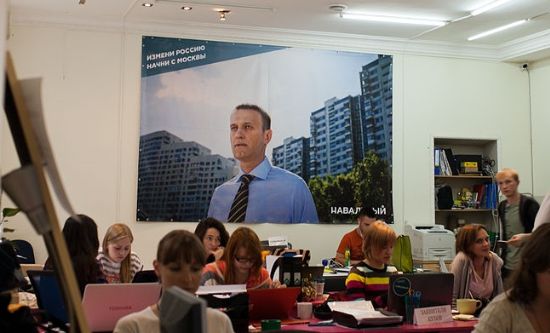
The alleged poisoning of Russian social media star and investigative journalist Alexei Navalny in August last year was the latest episode of the long-running anti-Russia soap opera broadcast by Western media on behalf of US imperialism. NATO member states are all too happy to overlook extrajudicial murders by the governments of important political allies like Israel and Saudi Arabia. But when it comes to Russia, a feigned moral concern for free speech is the excuse for escalating a long-running rivalry. ADAM GREY reports.
Already the US has tightened the screw with fresh sanctions on Russian officials. Several UK insurers and a German contractor have pulled out of the Nord Stream 2 pipeline destined to bring Russian gas to Germany (and from there to the rest of the EU) as a result of political pressure.
NATO military forces have displayed increasing aggression. On 9 February the US announced it was stationing 200 troops and four B1 bombers in Norway – one of which then flew over the capitals of Lithuania, Latvia and Estonia on 3 March ‘in a show of solidarity with NATO allies’. Twitter last month removed 100 accounts ‘with Russian ties’ for ‘undermining faith in NATO’. This conflict stems from intensifying inter-imperialist rivalry.
Navalny treads the boards
Enter Alexei Navalny. Born near Moscow in 1976, Navalny is a son of factory owners, educated in finance and a self-described ‘market fundamentalist’. In the early 2000s he supported far-right nationalist rallies like the National March, breeding nostalgia for the Russian Empire and joining calls to ‘Stop Feeding the Caucasus’. He is on record for many racist comments against migrants from this period, which he still refuses to retract; in a video comparing Caucasian Muslims to cockroaches and flies, he called for their extermination. Shortly after being kicked out of the liberal Yabloko party in 2007, he founded the anti-immigrant National Russian Liberation Movement. By 2009 he was working as advisor to Kirov state governor Nikita Belykh, a member of the Union of Rightist Forces party.
A 2014 fraud conviction centred on his family’s business interests in the multinational cosmetics brand Yves Rocher. In 2010 he won a four-month scholarship at Yale University’s World Fellows Programme, a networking course for up-and-coming foreign political leaders. From then on, Navalny adopted a more respectable political brand, organising anti-Vladimir Putin tactical voting drives and setting up an anti-corruption investigative journalism unit to take easy aim at Russia’s various oligarchs. He took part in futile electoral contests, notably in the 2013 Moscow mayoral election and then for the 2018 presidential election. His platform included neoliberal demands for deregulation of housing and more competition in public services, alongside a Trump-style protectionist foreign policy.
The greatest showman
NATO intelligence agencies are always on the lookout for signs of unrest in Russia in their quest to overthrow Putin. Bourgeois media outlets jump at the first sign of protest in Russia, usually characterising street movements as ‘anti-Putin’ and ‘pro-democracy’ whether the people are protesting against a rise in retirement age (2018) or arrest of a far-right governor on murder charges (2020).
Recent analysis of leaked documents by The Grayzone alleges that NATO intelligence agencies use a variety of tactics, such as running journalist training programmes, fostering networks of influence, and promoting pro-NATO stories, to shape political power in both NATO-aligned and Russia-allied nations. This includes grants to ‘impartial’ multinational news organisations like the BBC and Thompson Reuters as well as ‘independent’ investigative agencies like Bellingcat, which broke elements of the Skripal poisoning story and is funded by the US state-sponsored regime change outfit, the National Endowment for Democracy.
On 19 January 2021 Navalny’s Anti-Corruption Foundation (FBK) released a video titled Putin’s Palace, which investigated a residence it claimed was built by Putin using state funds. According to Russian TV station Russia 1, the video was produced in Germany while Navalny recovered from his poisoning and was directed by a Los Angeles-based company. Most of the allegations of this video has been disproved or debunked by independent journalists. Yet, despite the recent campaign of Western media against ‘fake news’, it is treated as gospel truth on outlets like the BBC.
The FBK itself is registered as a foreign agent by the Russian state since a sting operation revealed its chief executive negotiating cash for influence with an MI6 agent. YouTube, which often puts disclaimers underneath politically sensitive videos, has nothing to say about the Putin’s Palace video. It breezily labels the taxpayer-funded BBC a ‘British public broadcast service’ while its Russian counterpart, RT, is ‘funded in whole or in part by the Russian government’. Two explicit aims of the programmes uncovered by the Grayzone analysis were to co-ordinate anti-Kremlin content on YouTube and to push Russian-language RT output further down search engine results pages.
A small audience
From the description of Russian politics in Western media you would never know that the second most popular political party (after the ruling United Russia party) is the Communist Party, which also has the second most seats in the legislature and is runner-up in most elections. From the uncritical promotion of Navalny you would never know that, even among the youth who are his supposed base, only 36% approve of his activities, while among over 55s, 66% disapprove. Navalny is also mistrusted by many Russians who see him as a foreign stooge with no solid beliefs of his own. They remember an age when housing in Russia was plentiful, employment was a right, access to childcare was universal, and so on. Navalny’s reactionary programme would make life for them far worse.




